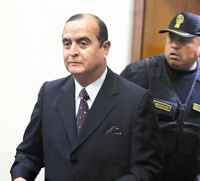By R. Renee Yaworsky
Impunity Watch Reporter, South America
LA PAZ, Bolivia—Protests have continued against a controversial new law in Bolivia. Members of the press and others fear that the “Law Against Racism and All Forms of Discrimination” will hamper their freedom of expression; supporters of the law herald it as a step toward equality.
The two disputed articles of the new legislation—Articles 16 and 23—make it illegal for journalists to publish or broadcast anything that could be construed as discriminatory. The law also holds members of the press responsible for statements uttered by third parties.
Opponents of the law say they are concerned that the government will use the regulation’s language to eliminate voices of opposition.
During a protest in Santa Cruz last week, demonstrators wearing muzzles held signs reflecting sentiments such as, “democracy is dead,” “don’t muzzle our children’s future,” and “life is nothing if liberty is lost.” A journalist tied a microphone to a noose and labeled it, “The PRESS-R.I.P.” Many have dubbed the law “la ley mordaza,” which means “the muzzle law.”
The law’s proponents see things differently. “The bill protects and guarantees equal treatment for all people,” Vice President Alvaro Garcia Linera said. “We have to combat a culture of racism. . . . Do not forget that until four years ago the indigenous were discriminated against and abused, handicapped in their social and economic presence with racist epithets and attacks.”
An article by Workers World commended the law as a “triumph for the working class and oppressed,” and “for Bolivia’s majority Indigenous population and for the Afro-Bolivian community as well, both of which have suffered 500 years of oppression.”
There doesn’t seem to be an immediate end to the controversy. Journalists are presently trying to collect a million signatures to overturn Article 16 and modify Article 23.
The Bolivian Bishops’ Conference released a statement which reaffirmed the “commitment to any initiative that leads to the removal of racism and discrimination,” but expressed worry over the “imminent risk associated with the recent approval and promulgation of that law, in regards to the exercise of the principles and fundamental rights of individuals and institutions.”
For more information, please see:
Committee to Protect Journalists-In Bolivia, anti-discrimination law raises concerns-18 October 2010
Workers World-New Bolivian law guarantees equality-15 October 2010
Andean Information Network-Conflict and Consensus: The Anti-Racism and Discrimination Law in Bolivia; Part I:Content and Justification of the Legislation-15 October 2010
Fides-America/Bolivia: Church promotes dialogue between journalists and government on anti-racism law-14 October 2010
CNN-Protests Continue in Bolivia Over Controversial Racism Law-14 October 2010


